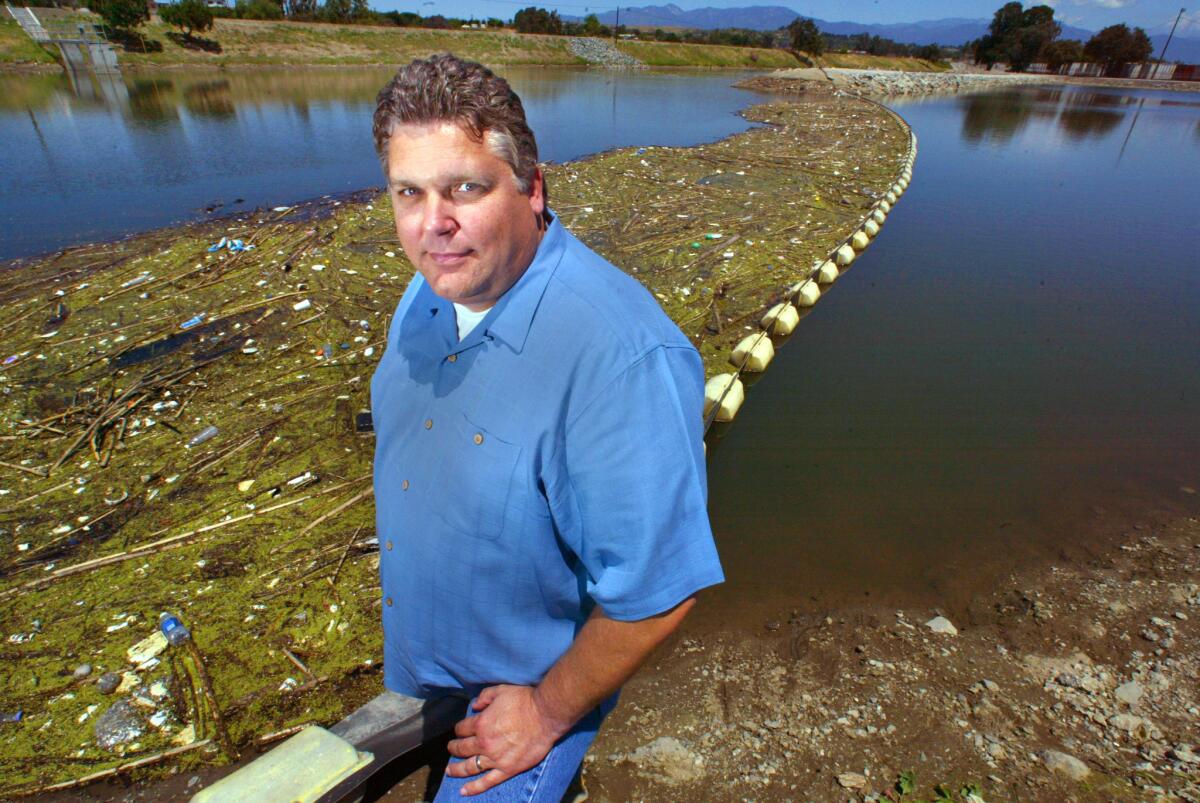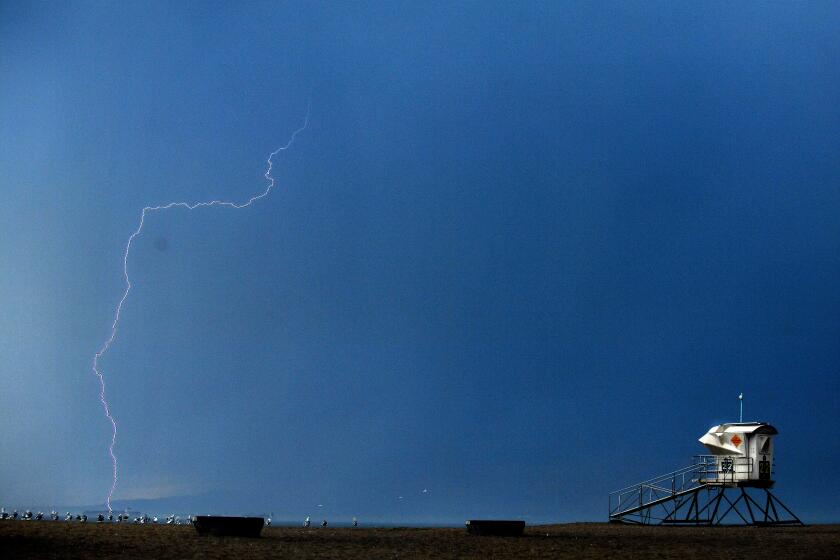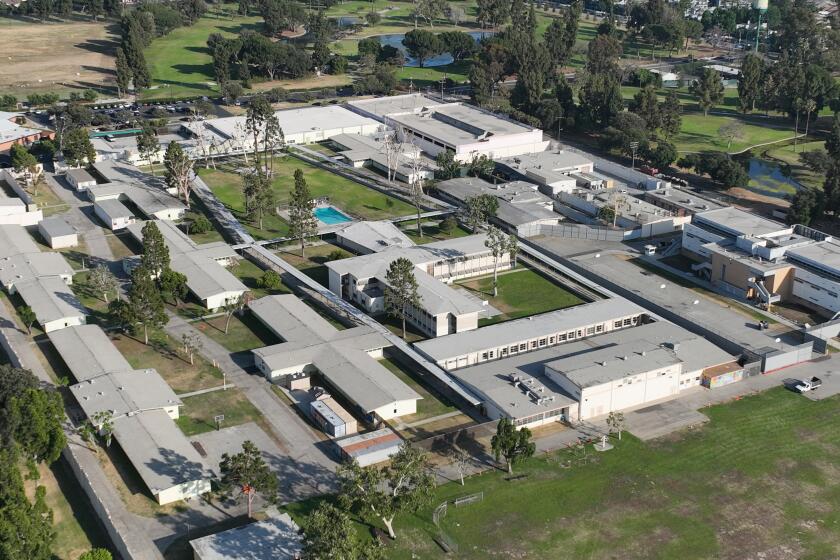Water district found itself drowning in steep legal fees

Water Replenishment District General Manager Robb Whitaker, shown in 2005, said of hiring Latham & Watkins, “Based on the complexity of the case, we went to an hourly rate to better track legal activity.”
- Share via
Facing a lawsuit from cities over its pumping rates, the Water Replenishment District of Southern California called in the big guns.
Latham & Watkins LLP -- a blue-chip, international law firm with more than 2,000 lawyers – would be the “bazooka” the agency needed, director Albert Robles said.
“I wanted to intimidate the cities,” said director Robert Katherman.
But that strategy came with a price: Latham & Watkins charged hourly rates of $285 for a paralegal up to $790 for a senior partner, according to district records. Aleshire & Wynder LLP -- the firm representing Downey, Cerritos, Signal Hill and Bellflower -- charged $150 and $300 for the same services.
In a span of 10 months, Latham & Watkins billed the district more than $5 million in legal fees, according to invoices. That was about $1 million more than what the cities were charged by attorneys over five years.
Director John Allen, who joined the Water Replenishment District board in January, said he was stunned by the legal fees, calling them “unsustainable.”
“It became apparent we were going to sign checks larger than what these cities were suing us for,” he said.
Two weeks ago, the WRD settled the case, agreeing to pay the cities that sued it $9.1 million.
“In a way, I’m glad they brought that firm in,” said attorney David Aleshire, who represented the cities. “Maybe they thought we’d just roll over and surrender but we were operating under rates that would allow us to go all the way. WRD was operating on a time frame of what it could afford.”
Several WRD officials defended the legal fees charged by Latham, saying the firm -- which played a key role in a successful campaign to save the city of Vernon from being dissolved by the state Legislature -- helped them reach a better resolution than they might have otherwise. It cleared the table for the WRD to move on, officials said.
“This settlement was good no matter how you slice it,” Robles said. “Was it worth hiring a firm with high fees? Absolutely, without a doubt.”
The WRD manages the Central and West Coast groundwater basins which provide water to about 4.5 million residents in 43 cities in Los Angeles County.
By the time Latham & Watkins was hired in June 2014, the water agency had gone through a couple of law firms. “We were in dire straits,” Lynn Dymally, an ex-director, said, regarding the need to quickly hire another firm.
With a trial date approaching, they chose Latham & Watkins – a firm experienced in water law, but whose rates were far from typical of those most municipal governments were used to paying. In years past, the city of Vernon had paid the firm up to $975 an hour.
The WRD ended up exceeding its $2-million litigation budget for 2014-15 by almost double, according to district officials
Frank Pizzurro, a spokesman for Latham & Watkins, declined to comment because the case is ongoing. The settlement has not been finalized by a Superior Court judge.
Jessica Levinson, a professor at Loyola Law School who specializes in good governance, said public agencies need to do everything they can to control legal costs.
“You just don’t get to take your eyes off the ball, especially when you’ve paid for an expensive ball,” Levinson said.
The lawsuit against WRD began August 2010 when Signal Hill, Downey and Cerritos accused the agency of violating Proposition 218, a 1996 law prohibiting agencies from charging customers more than the cost of service provided.
The cities alleged that the agency did not follow the measure’s procedural requirements when it set rates for pumping underground water from the basin. At the time, they sought a refund of $19 million for rates dating back to 2006, according to court records.
Bellflower later joined the fight and other cities and water agencies were set to follow until the district promised to pay them back if it lost the case in exchange for not suing, according to Robles and other directors.
The trial was set to start in December. Dymally, the former director, said that originally one law firm with help from two others was representing the district. But that changed amid questions about legal billings and other issues involving one of the firms, Dymally and Robles said.
“Based on the complexity of the case, we went to an hourly rate to better track legal activity and associated fees,” WRD General Manager Robb Whitaker said of hiring Latham & Watkins. “We negotiated a reduced hourly rate.”
Like other directors, Katherman said he would have liked to have seen WRD have its day in court. But he said that became an increasingly difficult proposition with steep legal bills continuing to rack up.
“Had it not been so expensive,” Katherman said, “I think we would have stayed the course.”
Looking back, Robles said he wishes it had not taken five years to resolve the issue with the cities.
“In retrospect, I would have been OK with hiring Latham & Watkins from the beginning,” he said.
Twitter: @latvives
More to Read
Sign up for Essential California
The most important California stories and recommendations in your inbox every morning.
You may occasionally receive promotional content from the Los Angeles Times.














